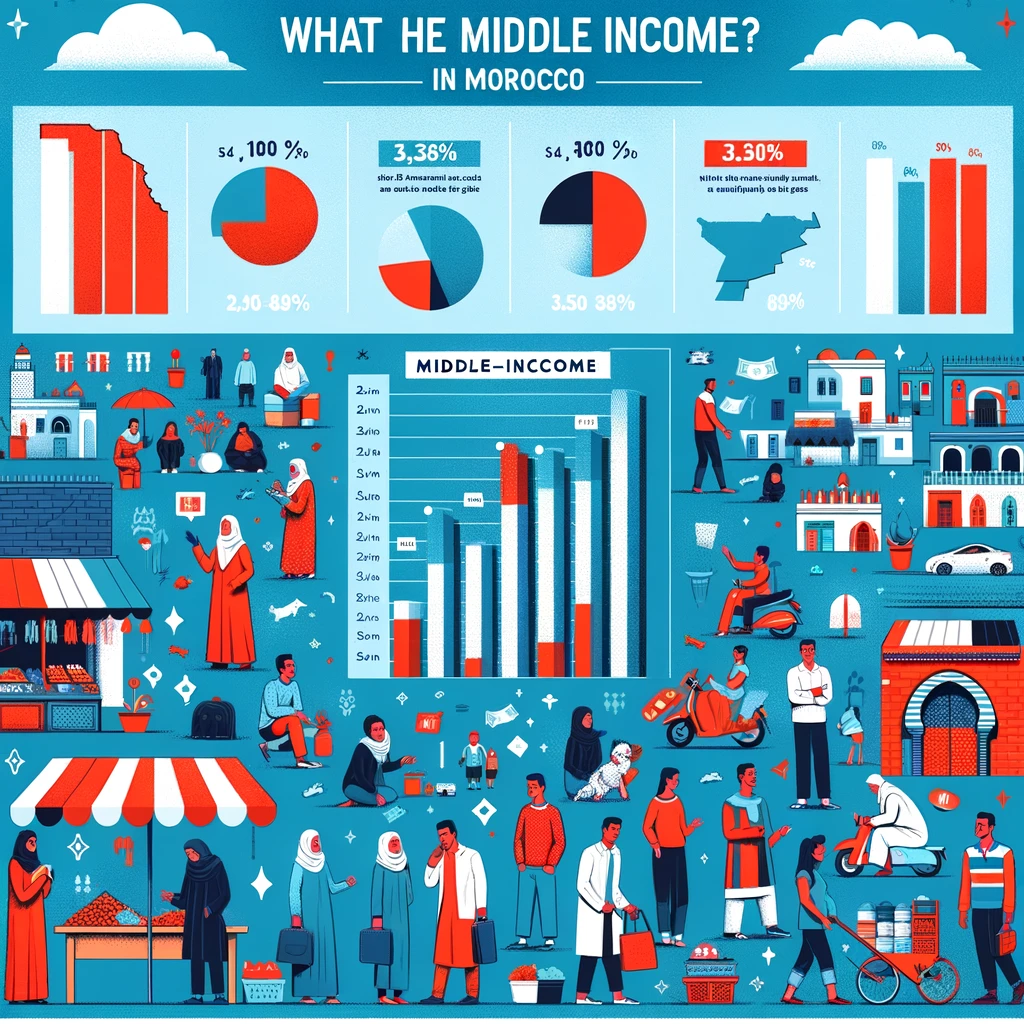Address: Front office : Twin Centre Tower A 6th floor Corner boulevard zerktouni and boulevard El Massira Casablanca Back office : espace ghazwani, Boulevard Ifni, Casablanca
Opening hours :Mon - Fri: 9am-12.30pm and 2pm-6pm Sat: 9am-12pm
Address: Front office : Twin Centre Tower A 6th floor Corner boulevard zerktouni and boulevard El Massira Casablanca Back office : espace ghazwani, Boulevard Ifni, Casablanca
Opening hours :Mon - Fri: 9am-12.30pm and 2pm-6pm Sat: 9am-12pm

In an era where economic benchmarks are pivotal in shaping national policies and individual expectations, understanding the middle income in Morocco is crucial. This detailed exploration provides an insight into the financial fabric of Moroccan society, analyzing various factors contributing to the economic standing of the country’s middle class.
Morocco, a nation with a rich history and diverse economic sectors, has seen its economic landscape evolve dramatically in the 21st century. From the bustling souks of Marrakech to the modern business hubs of Casablanca, the country’s economic activities are as varied as its culture. Agriculture, tourism, and manufacturing form the backbone of the Moroccan economy, contributing significantly to the nation’s Gross Domestic Product (GDP).
Middle income, a term often associated with financial stability and a modest lifestyle, can be a subjective measure. However, in the context of Morocco, it reflects the income bracket that separates the lower one-third of the income distribution from the upper one-third. This segmentation is critical in grasping the purchasing power and living standards of the average Moroccan household.
To understand the middle income in Morocco, we delve into the statistics. According to the latest reports from Morocco’s High Commission for Planning (HCP), the median salary in Morocco stands at approximately MAD 5,000 per month. However, the middle-income bracket is broader, generally ranging between MAD 3,000 and MAD 10,000 monthly, accommodating various professionals and skilled workers.
Several factors play a decisive role in the determination of middle income levels in Morocco. These include the urban-rural divide, with urban centers typically showcasing higher income levels due to diversified job opportunities and higher living costs. Additionally, the level of education and industry of employment are significant determinants of an individual’s income bracket within the Moroccan economy.
Morocco’s geography contributes to the regional disparities in income. The Western regions, which house major cities and economic centers, report higher average incomes compared to the agrarian-centric and less-industrialized Eastern and Southern regions. Such variations are essential to consider when discussing the national median income.
Education in Morocco has a direct correlation with earning potential. Higher educational qualifications often lead to better job prospects and, consequently, a position in the middle or upper-middle-income tiers. The Moroccan government’s efforts to improve educational infrastructure reflect the importance of education in economic growth and income distribution.
The sector of employment is another critical factor influencing middle income in Morocco. The service sector, including tourism and finance, offers considerable middle-income opportunities. In contrast, the industrial sector, notably the phosphate industry, is a major contributor to the nation’s exports and presents a different set of middle-income jobs with its own growth dynamics.
Morocco’s economic reforms over the past decades, aimed at liberalization and diversification, have had a significant impact on the country’s income distribution. Privatization, trade liberalization, and investment in infrastructure have opened new avenues for employment, contributing to the expansion of the middle-income class.
Despite positive strides, the middle-income group in Morocco faces challenges, such as inflation and unemployment, which threaten its financial security. Nonetheless, the prospects for growth, spurred by government initiatives in renewable energy, tourism, and technology, hold promise for an increase in middle-income numbers and overall economic resilience.
The middle income in Morocco is a dynamic measure, influenced by an array of socioeconomic factors. It serves as a barometer for the country’s economic health and provides insight into the opportunities and challenges faced by its citizens. As Morocco continues to navigate through economic reforms and global integration, the middle-income bracket remains a key focus for policy-makers and international observers alike.
Understanding the subtleties of middle-income levels in Morocco is not only important for residents and economists but also for investors and businesses looking to enter the Moroccan market. With its strategic location and growing economy, Morocco continues to be an attractive destination for those looking to tap into the potential of a burgeoning middle class.